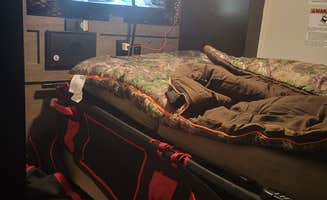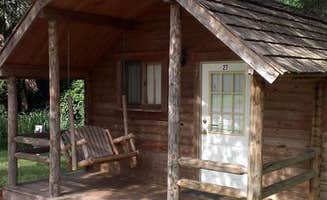Osprey, Florida, located in Sarasota County, sits at an average elevation of just 16 feet above sea level, creating a unique lowland camping environment characterized by marshlands, coastal ecosystems, and subtropical vegetation. The area experiences average winter temperatures between 53-75°F and summer temperatures between 73-91°F with high humidity. Year-round camping is possible, though primitive campers should prepare for wet conditions from June through October when the region receives most of its annual 54 inches of rainfall.
What to do
Primitive hiking trails: Myakka River State Park offers multiple primitive camping opportunities with varying degrees of difficulty. "They have great primitive sites, with hikes that vary from 2 miles to 14 miles to camp sites. Beware of heat, bring plenty of water. Don't depend on water pumps," advises Michael K. from Myakka River State Park.
Fossil hunting: The Peace River area provides unique opportunities to search for ancient shark teeth and fossils. "Right on the Peace River for fossil hunting - we found LOTS and the camp store sells all the gear you need," reports Dan X. from Peace River Campground.
Kayak exploration: Camp Venice Retreat offers direct water access for paddlers. "Easy river access. Paddle the Myakka River in both directions. Plenty of wildlife - and gators! No worries, they'll leave you alone if you don't bother them," shares Rich A., who recommends launching directly from your campsite.
Island exploration: For those seeking more remote camping experiences, boat access camping offers unique opportunities. "Cayo Costa is absolutely the best place for getting away from everything civilized! They offer primitive camping only, bring your tent and good stakes as the wind is steady there," advises Jeanene A. Explore 9 miles of undeveloped beach and interior trails.
What campers like
Wildlife viewing opportunities: Campers consistently mention wildlife sightings as a highlight. "When we kayak we were greeted by dolphins, sting rays and manatees," shares Joe R. from Fort De Soto Campground, where waterfront camping creates constant opportunities for wildlife observation.
Tent camping near water: Many campgrounds offer waterfront primitive sites. "This is a nice campground with a beach, little island you can wade to we always see Manatees there and lots of great areas to Kayak or paddle board," notes B.M. from E.G. Simmons Regional Park, which features many waterfront tent sites.
Yurt accommodations: Peace River Campground offers yurt camping near Osprey, Florida for those seeking a blend of tent and cabin experiences. "Peace River is the place to go in SWFL if you have toys! Trails, mud holes, beaches," notes Leslie M., highlighting the surrounding recreational opportunities available to yurt campers.
Stargazing: Remote camping locations provide exceptional night sky viewing. "Stargazing is to die for...no ambient light to wash out the blackness of the night sky," reports Dave V. about the island camping experience, making certain areas ideal for astronomy enthusiasts.
What you should know
Insect preparation is essential: Florida's subtropical environment means bugs are a constant consideration. "WHATEVER YOU DO BRING BUG PROTECTION! I brought sawyers big lotion and 2 thermacell bug repellents and in 24 hours got 2 bug bites! Fire ants too are a big thing," advises Tatiana M. from Cayo Costa State Park.
Wildlife safety protocols: Alligators are common throughout the region. "Went to drain the tanks yesterday morning and a large sounding gator started to growl territorially at me. So heads up with your pets please," warns Jenelle J. from Myakka River State Park, highlighting the importance of wildlife awareness.
Flooding concerns: Low elevation means water management is crucial. "Many large rigs were parked in the flood plane which encompasses a large section of the park," notes Laura H., recommending checking weather conditions before arrival at certain campgrounds.
Weather patterns: Florida's seasonal patterns affect camping conditions. "From June through October, it'll ordinarily rain for a short duration in the afternoon. Nothing to worry about and it cools things down," explains a camper, noting that summer afternoon showers are predictable and brief.
Tips for camping with families
Beach camping options: Fort De Soto Campground provides family-friendly beach access. "Great park with days worth of activities! The historic fort, scenic beaches, trails for hiking or biking, etc made for a great visit! Tons of wildlife - we saw raccoons, dolphin, manatee, tons of birds!" reports Brennan H.
Playground facilities: Look for campgrounds with built-in play areas. "There is a playground with good swings and also a sturdy playground that offered plenty of opportunity for my four year old to blow off some steam. The ground is all recycled rubber, which I love as a parent," shares Joe R.
Kid-friendly activities: Many campgrounds offer programming for children. "They usually have activities like bingo in the evenings. Close to grocery stores if you need something and the nearest town is cute," notes Angie S., highlighting the mix of organized activities and convenience.
Family safety: When yurt camping near Osprey, Florida with children, safety precautions matter. "It seems as though you are marooned on your own little island. You'll enjoy a myriad of water birds (herons, egrets, diver ducks, anhinga, spoonbills, pelicans, sea gulls) along with osprey, bald eagles, kingfisher and kites," shares a reviewer, noting that while wildlife viewing is excellent, appropriate supervision is necessary.
Tips from RVers
Seasonal site considerations: Horseshoe Cove RV Resort offers year-round accommodations with different site options. "I mainly choose this campground because it was close to my son's home in Sarasota. The people in the office were very nice. The park is kept clean. I am in the pull thru sites which are a little tight and can be challenging to park on in big rigs," advises Don.
Hookup availability: Understand site utilities before arrival. "We stayed at the PR section with full hookups. Site was spacious and the park even had smiling gators," notes a camper who appreciated the comprehensive facilities available at certain sites.
Road conditions: Internal campground roads vary significantly. "Roads are narrow with lots of turns. If you have a big rig with a toad I suggest dropping the toad by the office to park rig and have your partner drive to site with you," suggests Don, providing practical advice for larger setups.
Voltage monitoring: During peak times, monitor electrical systems. "Watch the electricity during high usage the voltage drop, ours dropped to 108v for a couple hours, I choose to run the gen during that time," advises Thomas E., highlighting the importance of being prepared for utility fluctuations.





